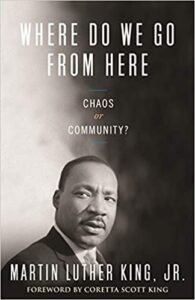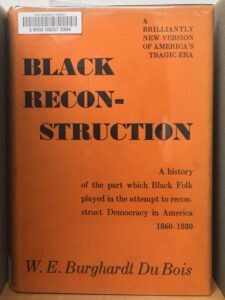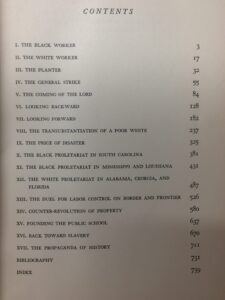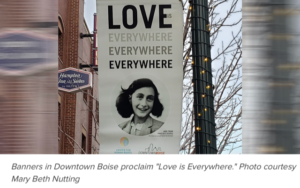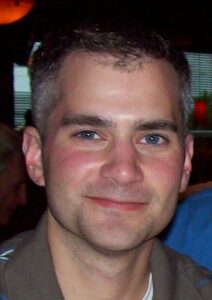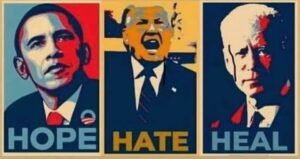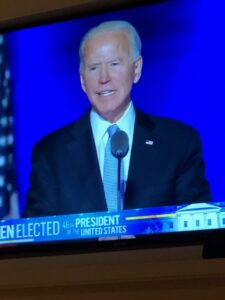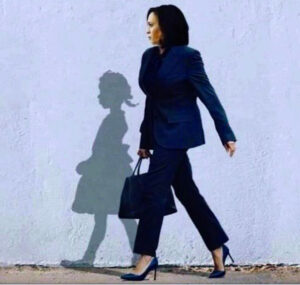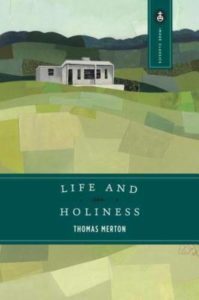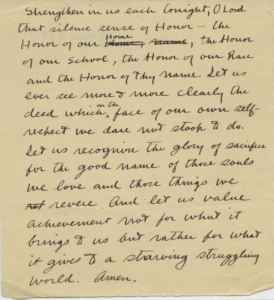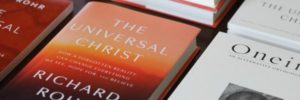W.E.B. Du Bois
Chaos or Community?
January 9, 2021Martin Luther King asked us this question in 1967, not long before his assassination. After witnessing January 6th, we ask again. We are in a pivotal moment, again, in this country, and now, exacerbating the civil unrest, is a radicalized population with instantaneous virtual connection and unmitigated amounts of disinformation and conspiracy. For those engaged in the disinformation exchange, these are not theories, it is reality.
Social media platforms are suspending, and they’re too late.
Whistleblower Christopher Wylie (think Cambridge Analytica and pink hair):
Platforms like Facebook have been responsible for digitally segregating Americans for years. To move forward, we need to apply de-segregation principles to social media. That starts with regulating Facebook’s underlying digital architecture and design.
Truly, though, does anyone see them doing this anytime soon? No. Profit and power is their mantra.
A recommended read essay from author, and Yale history professor Timothy Snyder. His book, On Tyranny [2017], needs to be on your bookshelf.
Here’s the link to his essay published today in The New York Times Magazine.
https://www.nytimes.com/2021/01/09/magazine/trump-coup.html?smid=tw-share
Post-truth is pre-fascism, and Trump has been our post-truth president. When we give up on truth, we concede power to those with the wealth and charisma to create spectacle in its place. Without agreement about some basic facts, citizens cannot form the civil society that would allow them to defend themselves. If we lose the institutions that produce facts that are pertinent to us, then we tend to wallow in attractive abstractions and fictions. Truth defends itself particularly poorly when there is not very much of it around, and the era of Trump — like the era of Vladimir Putin in Russia — is one of the decline of local news. Social media is no substitute: It supercharges the mental habits by which we seek emotional stimulation and comfort, which means losing the distinction between what feels true and what actually is true.
[…]
My own view is that greater knowledge of the past, fascist or otherwise, allows us to notice and conceptualize elements of the present that we might otherwise disregard and to think more broadly about future possibilities. It was clear to me in October that Trump’s behavior presaged a coup, and I said so in print; this is not because the present repeats the past, but because the past enlightens the present.
Thanks to technological capacity and personal talent, Donald Trump lied at a pace perhaps unmatched by any other leader in history.
[…]
When Senator Ted Cruz announced his intention to challenge the Electoral College vote, he invoked the Compromise of 1877, which resolved the presidential election of 1876. Commentators pointed out that this was no relevant precedent, since back then there really were serious voter irregularities and there really was a stalemate in Congress. For African-Americans, however, the seemingly gratuitous reference led somewhere else. The Compromise of 1877 — in which Rutherford B. Hayes would have the presidency, provided that he withdrew federal power from the South — was the very arrangement whereby African-Americans were driven from voting booths for the better part of a century. It was effectively the end of Reconstruction, the beginning of segregation, legal discrimination and Jim Crow. It is the original sin of American history in the post-slavery era, our closest brush with fascism so far.
If the reference seemed distant when Ted Cruz and 10 senatorial colleagues released their statement on Jan. 2, it was brought very close four days later, when Confederate flags were paraded through the Capitol.
W.E.B. Du Boise, 1st edition, 1935, Beinecke Library:
The lie outlasts the liar. The idea that Germany lost the First World War in 1918 because of a Jewish “stab in the back” was 15 years old when Hitler came to power. How will Trump’s myth of victimhood function in American life 15 years from now? And to whose benefit?
[…]
If Trump remains present in American political life, he will surely repeat his big lie incessantly.
[…]
America will not survive the big lie just because a liar is separated from power. It will need a thoughtful repluralization of media and a commitment to facts as a public good.
From journalist Maria Ressa:
What happened Jan 6 in the US is a logical consequence of the radicalization, the “seeding & spread of conspiracy theories enabled by social media. It’s time to demand accountability. (Facebook is a behavior modification system.)”
Washington Post
A radicalized Air Force vet, Obama supporter, “and after years of personal travails, Ashli Babbitt believed she had found a cause that gave her life purpose. Within hours, that cause would bring her life to a violent end.”
https://www.washingtonpost.com/dc-md-va/2021/01/09/ashli-babbitt-capitol-shooting-trump-qanon/
ProPublica:
‘Some far-right activists are already calling for retribution over the death of Ashli Babbitt. “We’re not putting up with this tyrannical rule. We will return on Jan 19th, carrying our weapons in numbers that no standing army or police agency can match.”
https://www.propublica.org/article/several-well-known-hate-groups-identified-at-capitol-riot
From Jane Mayer at The New Yorker:
Bobby Pickles, a purveyor of far-right T-shirts, joined the horde of balding dudes in dad jeans at the Capitol, because Donald Trump, he says, is “like punk rock.”
He explained that after his father died, in 2015, he sought out new male camaraderie. The Proud Boys filled a vacuum. He claims to have joined not because they are a hate group (as designated by the Southern Poverty Law Center) but because “they were seeking something.” He said, “I came to the realization that Trump was awesome, and that I had been brainwashed.” From right-wing podcasts and YouTube, he said, he has learned that “the pandemic is a scam,” and that “we live in an inverted dictatorship run by the Deep State and globalists.”
“We couldn’t really see the President, we were listening on our phones & when we heard him say, ‘Go to the Capitol,’ we all were, like, ‘Yeah!’ So directed, Pickles & his group began marching. “Things are escalating. I hate to see what happens next.”
https://www.newyorker.com/magazine/2021/01/18/a-palm-beach-proud-boy-at-the-putsch
The Guardian
From Sadiq Khan, the mayor of London:
The storming of the Capitol in Washington is a wake-up call for states around the world, writes the mayor of London
he events at the Capitol building in Washington were shocking, but sadly not that surprising. Yes, President Donald Trump incited a fascist mob to try to violently overthrow the legitimate outcome of a democratic election – but this was the tragic yet inevitable consequence of the far-right movement the president has built and fostered over the last five years.
Trump pitted his own citizens against each other. He preyed on genuine economic suffering. He lied to stoke fear of those who are different. He denied basic scientific facts about Covid-19 and refused to act to save lives and jobs. He separated children from their parents. He used people’s religion as a reason to ban them from coming to the US. He gave equivalence to far-right racists and anti-racist protesters. He denigrated women and denied many the right to choose what they do with their body.
And he also undermined and delegitimised the fundamental pillars of democracy – equality under the law, the freedom of the press, an independent judicial system and, ultimately, even elections themselves.
ragically, the warnings were deliberately ignored by too many supposedly mainstream politicians, commentators and observers around the world, including here in the UK. Some greedily eyed an opportunity for their own advancement, which they valued more than the long-term health of democracy. Others were simply too scared of the consequences of doing the right thing and challenging the ugly new populist and nativist political movements that Trump spawned.
Donald Trump’s defeat is not the end of his brand of far-right politics. More than 74 million voted for him in November. Viktor Orbán in Hungary, Jair Bolsonaro in Brazil, Recep Tayyip Erdoğan in Turkey, Matteo Salvini in Italy, Andrzej Duda in Poland and others are from the same mould. As are a growing group on the fringes of the Brexit movement.
People on both the left and right must show no hesitation in challenging racism and discrimination, be fearless in speaking up to protect all minority groups while promoting equality and focus relentlessly on tackling the economic inequalities and lack of opportunities that create a fertile breeding ground for the far-right – challenges that will only get harder after the pandemic.
We should tell truly inclusive patriotic stories about our national identity that show the genuine diversity of both our history and modern societies. And we need to be clear that compromising with those on the other side of the political aisle is not always a bad thing. Sometimes it is essential for the health of democracy.
Full piece:
Love is Everywhere banners placed in Downtown Boise, Idaho.
The Guardian also published an opinion piece by Daniel Ellsberg. It’s important read, especially if Donald Trump is allowed to stay in office prior to Joe Biden’s inauguration.
“I will always regret that I did not do more to stop war with Vietnam. Now, I am calling on whistleblowers to step up and expose Trump’s plans.”
Daniel Ellsberg was the whistleblower who leaked the Pentagon Papers, which revealed the US government had lied to the American public about the Vietnam war.
resident Trump’s incitement of criminal mob violence and occupation of the Capitol makes clear there is no limitation whatever on the abuse of power he may commit in the next two weeks he remains in office. Outrageous as his incendiary performance was on Wednesday, I fear he may incite something far more dangerous in the next few days: his long-desired war with Iran.
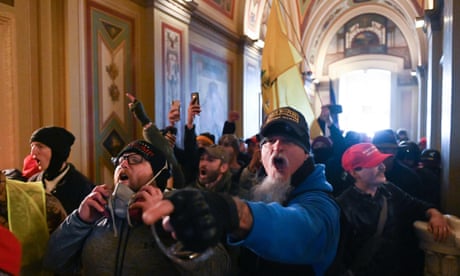
Could he possibly be so delusional as to imagine that such a war would be in the interests of the nation or region or even his own short-term interests? His behavior and evident state of mind this week and over the last two months answers that question.
The dispatch this week of B-52’s nonstop round-trip from North Dakota to the Iranian coast – the fourth such flight in seven weeks, one at year’s end – along with his build-up of US forces in the area, is a warning not only to Iran but to us.
In mid-November, as these flights began, the president had to be dissuaded at the highest levels from directing an unprovoked attack on Iran nuclear facilities. But an attack “provoked” by Iran (or by militias in Iraq aligned with Iran) was not ruled out.
[…]
I have little doubt that such contingency planning, directed by the Oval Office, for provoking, if necessary, an excuse for attacking Iran while this administration is still in office exists right now, in safes and computers in the Pentagon, CIA and the White House. That means there are officials in those agencies – perhaps one sitting at my old desk in the Pentagon – who have seen on their secure computer screens highly classified recommendations exactly like the McNaughton and Bundy memos that came across my desk in September 1964.
[…]
I am urging courageous whistleblowing today, this week, not months or years from now, after bombs have begun falling. It could be the most patriotic act of a lifetime.
https://www.theguardian.com/commentisfree/2021/jan/08/donald-trump-war-iran-tehran-daniel-ellsberg
In memoriam.
USA Today
Brian D. Sicknick, 42, the youngest of three sons, was from South River, New Jersey. He graduated in 1997 from Middlesex County Technical Vocational High School and joined the New Jersey Air National Guard that year.
Sicknick deployed to Saudi Arabia in 1999 in support of Operation Southern Watch. After the 9/11 terrorist attacks, he served in Kyrgyzstan in support of the war in Afghanistan. While stateside, Sicknick served in the 108th Air Refueling Wing out of Joint Base McGuire-Dix-Lakehurst in New Jersey, his brother, Ken Sicknick, said.
He was honorably discharged in 2003, according to Lt. Col. Barbara Brown, a spokeswoman for the New Jersey National Guard.
Sicknick “wanted to be a police officer his entire life,” Ken Sicknick said. He “served his country honorably” and made his family “very proud,” Sicknicksaid. “Brian is a hero and that is what we would like people to remember.”
Sicknick died “due to injuries sustained while on duty,” U.S. Capitol Police said in a statement. On Wednesday, he “was injured while physically engaging with protesters,” police said. He returned to his division office and collapsed, then was taken to a local hospital where he died around 9:30 p.m. Thursday.
Sicknick was hit in the head with a fire extinguisher, according to two law enforcement officials who spoke to the Associated Press.
The murder investigation begins.
Five people lost their lives, countless others were injured, all directly related to January 6th, 2021.
Heal. And unite.
November 8, 2020
🤎 I love this image, especially because not only does he embody hate, I am reminded hate is born of fear and fragmentation, threading in and out of our existence on this plane. Somehow, we, this country, allowed him to be celebrated after decades of his darkness…his evil energy. May he always be a reminder for what we don’t want to be and stay diligent against these dark forces. May he be dissolved, and fade from our public platforms and consciousness. May those who supported him be awakened to his destructive energies and dark heart. May their eyes be opened. And may they want to unite with all of us to be one people, to know what is true, justified, equal…for all beings…especially the oppressed and marginalized. Let us, together, be reminded of what it means to reside in the heart of democracy and fix what has been broken since this country was born.
And then, may we heal.
-dayle
From Joe Biden, the 46th President of the United States:
“For all those of you who voted for President Trump, I understand the disappointment tonight. I’ve lost a couple of times myself. But now, let’s give each other a chance. It’s time to put away the harsh rhetoric, lower the temperature, see each other again, listen to each other again. And to make progress we have to stop treating our opponents as enemies.”
Alluding to scripture, he added: “This is the time to heal in America.”
From the Vice-President Elect, Kamala Harris, the first woman, a woman of color, Black and Southern Asian woman, to be elected to this office.
“Protecting our democracy takes struggle. It takes sacrifice. But there is joy in it. And there is progress. Because we, the people, have the power to build a better future.”
We The People
For those who voted, again, for the current president, please answer, ‘Why’? What did he do for you? During a pandemic? Employment? Opportunity? Fairness? Equality? Or, is it deeper? Fear? Nationalism? Culture? Bias? Concerns over race? Majorities? Disinformation? Social media platforms?
- Truth.
- Faith.
- Clarity.
- Compassion.
- Empathy.
May we heal. And unite. Not half of us…all of us. We. The. People.
W.E.B. Du Bois:
Strive for that greatness of spirit that measure life not by its disappointments, but by its possibilities.
Desmond Tutu:
My humanity is bound up in yours, for we can only be human together.
The collective heart of humankind’s suffering.
Thomas Merton:
The whole idea of compassion is based on a keen awareness of the interdependence of all these living beings, which are all part of one another and all involved in one another.
Friends,
Today, we celebrate our democracy, our common humanity, and a glass ceiling shattered once and for all.
With nearly 160 million votes cast, Joe Biden and Kamala Harris have won a decisive victory. They received more than 75 million votes, a greater number than any ticket in history, with a remarkable breadth of support from across the nation.
And they shattered several glass ceilings—it will be a joy to watch Vice President-elect Kamala inspire generations of future leaders and active citizens!
Across the Collective, we have seen so many give so much over these past four years, using a range of tools to fight for justice, equality, and our democracy. I am thankful and full of admiration.
We now have the opportunity to work for the systemic solutions we know we need—solutions that can remake the calcified systems in our country, from immigration and education to race and reconciliation, criminal justice and climate. And it will require each of us to bring spirit of ingenuity and hard work to support and accelerate America’s rebuilding and renewal.
We will let out the breath we have been holding in for so long. As celebratory as we feel, we also know that much work lies ahead—the work of healing the wounds and repairing the breaches.
So, we will get to work, and usher in the America we know is possible.
With relief and gratitude,
Laurene, Emerson Collective
Empathy + Sympahty = Compassion
We are a progressive being.
There is nothing at a standstill in nature.
Only God is motionless for (S)He was, is and will be the same yesterday,
today and tomorrow,
and yet, is ever moving.
-Mahatma Gandhi
I will never understand how 70,000,000+ people could vote for him again. Never. Perhaps, maybe, hopefully, some will evolve to understand his destructive and immoral behaviors. He has shown us who he is for decades. Some of us (me) gave him no mind. And then, he was elected to serve. He did not serve. He lied. He divided. And he hated. Hate is born of fear. What was feared?
Perhaps, we have always been this divided, but the ugly part was given platform and verbalized. Democracy, we have learned, is not passive, but active. We can not simply turn out the vote every two, or four years.
We must edify and protect the marginalized and oppressed. The government serves us, we don’t serve it.
A true democracy is messy and necessary. And it requires ‘good trouble.’
Now, let’s work to balance the scales and bring Jon Ossoff and Rev. Raphael Warnock to the U.S. Senate in Georgia. The shadow president, Senator Mitch McConnell, will continue to strangle democracy and refuse to move policy forward if we do not achieve balance. Please donate or volunteer:
electjon.com warnockforgeorgia.com
James Martin, SJ:
It is, and always has been, possible to speak respectfully about someone with whom you disagree. Here’s how: “Though we have political differences, I know Joe Biden to be a good man who has won his opportunity to lead and unify our country.”
Krista Tippett, journalist and author:
What is the story of “us”? How do we learn it, how do we tell it, and how to shift it, across dehumanizing divides, in enduring ways?
Padraig O’ Tuama, poet:
In all the waiting of your week — for results from elections, for different news, for finality, for certitude — the work of the past is calling for attention. A new future will only be built on courageous moments, and those are happening now, and now and now. In the waiting, we are with you, considering history, paradise and conflict, considering how these patterns of time are inviting us to new actions.
U
N
I
T
E
On Being:
What do you notice about how you behave in times of conflict? Do you tend toward avoidance? Or compromise? Or collaboration? Or competition? Or accommodation?
This poem describes a conflict between neighbors: a tree hangs over a fence. The owners love this tree; their neighbors don’t. Somebody responds directly, somebody else avoids, a chainsaw appears. Suddenly this conflict becomes a parable for all conflicts, illustrating how deep they can go and how often they cannot be resolved with a question about what to do.
‘Conflict is not two sides, but many sides.
What is the definition of love between conflict?’
Will we learn how to listen to each other again; we are not enemies–we are merely opponents. We have more in common than we know, or perhaps, are willing to admit. .d
Compassion, love and truth.
February 22, 2020
‘Human nature is not evil. All pleasure is not wrong. All spontaneous desires not selfish. The doctrine of original sin does not mean that human nature has been completely corrupted and that man’s freedom is always inclined to sin.
Man is neither a devil nor an angel. He is not pure spirit, but a being of flesh and spirit, subject to error and malice, but basically inclined to seek truth and goodness. He is, indeed, a sinner: but their hearts respond to love and grace. It also responds to the goodness and to the need of his fellowman.’
-Thomas Merton, Life and Holiness [1963]
If we over-use the intellectual center, then our work lies in bringing the emotional and moving centers fully online and integrating them. Wisdom is a way of knowing that goes beyond one’s mind, one’s rational understanding, and embraces the whole of a person: mind, heart, and body. These three centers must all be working, and working in harmony, as the first prerequisite to the Wisdom way of knowing.
—Cynthia Bourgeault
This essay is excerpted from W.E.B. Du Bois’s 1903 book, The Souls of Black Folk.
O water, voice of my heart, crying in the sand,
All night long crying with a mournful cry,
As I lie and listen, and cannot understand
The voice of my heart in my side or the voice of the sea,
O water, crying for rest, is it I, is it I?
All night long the water is crying to me.Unresting water, there shall never be rest
Till the last moon droop and the last tide fail,
And the fire of the end begin to burn in the west;
And the heart shall be weary and wonder and cry like the sea,
All life long crying without avail,
As the water all night long is crying to me.
— Arthur Symons
“Between me and the other world there is ever an unasked question: unasked by some through feelings of delicacy; by others through the difficulty of rightly framing it. All, nevertheless, flutter round it. They approach me in a half-hesitant sort of way, eye me curiously or compassionately, and then, instead of saying directly, How does it feel to be a problem? they say, I know an excellent colored man in my town; or, I fought at Mechanicsville; or, Do not these Southern outrages make your blood boil? At these I smile, or am interested, or reduce the boiling to a simmer, as the occasion may require. To the real question, How does it feel to be a problem? I answer seldom a word.
And yet, being a problem is a strange experience,—peculiar even for one who has never been anything else, save perhaps in babyhood and in Europe. It is in the early days of rollicking boyhood that the revelation first bursts upon one, all in a day, as it were. I remember well when the shadow swept across me. I was a little thing, away up in the hills of New England, where the dark Housatonic winds between Hoosac and Taghkanic to the sea. In a wee wooden schoolhouse, something put it into the boys’ and girls’ heads to buy gorgeous visiting-cards—ten cents a package—and exchange. The exchange was merry, till one girl, a tall newcomer, refused my card,—refused it peremptorily, with a glance. Then it dawned upon me with a certain suddenness that I was different from the others; or like, mayhap, in heart and life and longing, but shut out from their world by a vast veil. I had thereafter no desire to tear down that veil, to creep through; I held all beyond it in common contempt, and lived above it in a region of blue sky and great wandering shadows. That sky was bluest when I could beat my mates at examination-time, or beat them at a foot-race, or even beat their stringy heads. Alas, with the years all this fine contempt began to fade; for the worlds I longed for, and all their dazzling opportunities, were theirs, not mine. But they should not keep these prizes, I said; some, all, I would wrest from them. Just how I would do it I could never decide: by reading law, by healing the sick, by telling the wonderful tales that swam in my head,—some way. With other black boys the strife was not so fiercely sunny: their youth shrunk into tasteless sycophancy, or into silent hatred of the pale world about them and mocking distrust of everything white; or wasted itself in a bitter cry, Why did God make me an outcast and a stranger in mine own house? The shades of the prison-house closed round about us all: walls strait and stubborn to the whitest, but relentlessly narrow, tall, and unscalable to sons of night who must plod darkly on in resignation, or beat unavailing palms against the stone, or steadily, half hopelessly, watch the streak of blue above.
After the Egyptian and Indian, the Greek and Roman, the Teuton and Mongolian,
the Negro is a sort of seventh son, born with a veil, and gifted with second-sight in this American world,—a world which yields him no true self-consciousness, but only lets him see himself through the revelation of the other world. It is a peculiar sensation, this double-consciousness, this sense of always looking at one’s self through the eyes of others, of measuring one’s soul by the tape of a world that looks on in amused contempt and pity.
One ever feels his two-ness,—an American, a Negro; two souls, two thoughts, two unreconciled strivings; two warring ideals in one dark body, whose dogged strength alone keeps it from being torn asunder.
The history of the American Negro is the history of this strife,—this longing to attain self-conscious manhood, to merge his double self into a better and truer self. In this merging he wishes neither of the older selves to be lost. He would not Africanize America, for America has too much to teach the world and Africa. He would not bleach his Negro soul in a flood of white Americanism, for he knows that Negro blood has a message for the world. He simply wishes to make it possible for a man to be both a Negro and an American, without being cursed and spit upon by his fellows, without having the doors of Opportunity closed roughly in his face.
This, then, is the end of his striving: to be a co-worker in the kingdom of culture, to escape both death and isolation, to husband and use his best powers and his latent genius. These powers of body and mind have in the past been strangely wasted, dispersed, or forgotten.
The shadow of a mighty Negro past flits through the tale of Ethiopia the Shadowy and of Egypt the Sphinx. Throughout history, the powers of single black men flash here and there like falling stars, and die sometimes before the world has rightly gauged their brightness. Here in America, in the few days since Emancipation, the black man’s turning hither and thither in hesitant and doubtful striving has often made his very strength to lose effectiveness, to seem like absence of power, like weakness. And yet it is not weakness,—it is the contradiction of double aims. The double-aimed struggle of the black artisan—on the one hand to escape white contempt for a nation of mere hewers of wood and drawers of water, and on the other hand to plough and nail and dig for a poverty-stricken horde—could only result in making him a poor craftsman, for he had but half a heart in either cause. By the poverty and ignorance of his people, the Negro minister or doctor was tempted toward quackery and demagogy; and by the criticism of the other world, toward ideals that made him ashamed of his lowly tasks. The would-be black savant was confronted by the paradox that the knowledge his people needed was a twice-told tale to his white neighbors, while the knowledge which would teach the white world was Greek to his own flesh and blood. The innate love of harmony and beauty that set the ruder souls of his people a-dancing and a-singing raised but confusion and doubt in the soul of the black artist; for the beauty revealed to him was the soul-beauty of a race which his larger audience despised, and he could not articulate the message of another people. This waste of double aims, this seeking to satisfy two unreconciled ideals, has wrought sad havoc with the courage and faith and deeds of ten thousand thousand people,—has sent them often wooing false gods and invoking false means of salvation, and at times has even seemed about to make them ashamed of themselves.
Away back in the days of bondage they thought to see in one divine event the end of all doubt and disappointment; few men ever worshipped Freedom with half such unquestioning faith as did the American Negro for two centuries. To him, so far as he thought and dreamed, slavery was indeed the sum of all villainies, the cause of all sorrow, the root of all prejudice; Emancipation was the key to a promised land of sweeter beauty than ever stretched before the eyes of wearied Israelites. In song and exhortation swelled one refrain—Liberty; in his tears and curses the God he implored had Freedom in his right hand. At last it came,—suddenly, fearfully, like a dream. With one wild carnival of blood and passion came the message in his own plaintive cadences:—
“Shout, O children!
Shout, you’re free!
For God has bought your liberty!”
Years have passed away since then,—ten, twenty, forty; forty years of national life, forty years of renewal and development, and yet the swarthy spectre sits in its accustomed seat at the Nation’s feast. In vain do we cry to this our vastest social problem:—
“Take any shape but that, and my firm nerves
Shall never tremble!”The Nation has not yet found peace from its sins; the freedman has not yet found in freedom his promised land. Whatever of good may have come in these years of change, the shadow of a deep disappointment rests upon the Negro people,—a disappointment all the more bitter because the unattained ideal was unbounded save by the simple ignorance of a lowly people.
The first decade was merely a prolongation of the vain search for freedom, the boon that seemed ever barely to elude their grasp,—like a tantalizing will-o’-the-wisp, maddening and misleading the headless host.
The holocaust of war, the terrors of the Ku-Klux Klan, the lies of carpet-baggers, the disorganization of industry, and the contradictory advice of friends and foes, left the bewildered serf with no new watchword beyond the old cry for freedom. As the time flew, however, he began to grasp a new idea. The ideal of liberty demanded for its attainment powerful means, and these the Fifteenth Amendment gave him. The ballot, which before he had looked upon as a visible sign of freedom, he now regarded as the chief means of gaining and perfecting the liberty with which war had partially endowed him.
And why not? Had not votes made war and emancipated millions? Had not votes enfranchised the freedmen? Was anything impossible to a power that had done all this? A million black men started with renewed zeal to vote themselves into the kingdom. So the decade flew away, the revolution of 1876 came, and left the half-free serf weary, wondering, but still inspired. Slowly but steadily, in the following years, a new vision began gradually to replace the dream of political power,—a powerful movement, the rise of another ideal to guide the unguided, another pillar of fire by night after a clouded day. It was the ideal of “book-learning”; the curiosity, born of compulsory ignorance, to know and test the power of the cabalistic letters of the white man, the longing to know. Here at last seemed to have been discovered the mountain path to Canaan; longer than the highway of Emancipation and law, steep and rugged, but straight, leading to heights high enough to overlook life.
Up the new path the advance guard toiled, slowly, heavily, doggedly; only those who have watched and guided the faltering feet, the misty minds, the dull understandings, of the dark pupils of these schools know how faithfully, how piteously, this people strove to learn. It was weary work. The cold statistician wrote down the inches of progress here and there, noted also where here and there a foot had slipped or some one had fallen. To the tired climbers, the horizon was ever dark, the mists were often cold, the Canaan was always dim and far away. If, however, the vistas disclosed as yet no goal, no resting-place, little but flattery and criticism, the journey at least gave leisure for reflection and self-examination; it changed the child of Emancipation to the youth with dawning self-consciousness, self-realization, self-respect. In those sombre forests of his striving his own soul rose before him, and he saw himself,—darkly as through a veil; and yet he saw in himself some faint revelation of his power, of his mission. He began to have a dim feeling that, to attain his place in the world, he must be himself, and not another. For the first time he sought to analyze the burden he bore upon his back, that dead-weight of social degradation partially masked behind a half-named Negro problem. He felt his poverty; without a cent, without a home, without land, tools, or savings, he had entered into competition with rich, landed, skilled neighbors. To be a poor man is hard, but to be a poor race in a land of dollars is the very bottom of hardships. He felt the weight of his ignorance,—not simply of letters, but of life, of business, of the humanities; the accumulated sloth and shirking and awkwardness of decades and centuries shackled his hands and feet. Nor was his burden all poverty and ignorance. The red stain of bastardy, which two centuries of systematic legal defilement of Negro women had stamped upon his race, meant not only the loss of ancient African chastity, but also the hereditary weight of a mass of corruption from white adulterers, threatening almost the obliteration of the Negro home.
A people thus handicapped ought not to be asked to race with the world, but rather allowed to give all its time and thought to its own social problems. But alas! while sociologists gleefully count his bastards and his prostitutes, the very soul of the toiling, sweating black man is darkened by the shadow of a vast despair. Men call the shadow prejudice, and learnedly explain it as the natural defence of culture against barbarism, learning against ignorance, purity against crime, the “higher” against the “lower” races. To which the Negro cries Amen! and swears that to so much of this strange prejudice as is founded on just homage to civilization, culture, righteousness, and progress, he humbly bows and meekly does obeisance. But before that nameless prejudice that leaps beyond all this he stands helpless, dismayed, and well-nigh speechless; before that personal disrespect and mockery, the ridicule and systematic humiliation, the distortion of fact and wanton license of fancy, the cynical ignoring of the better and the boisterous welcoming of the worse, the all-pervading desire to inculcate disdain for everything black, from Toussaint to the devil,—before this there rises a sickening despair that would disarm and discourage any nation save that black host to whom “discouragement” is an unwritten word.
But the facing of so vast a prejudice could not but bring the inevitable self-questioning, self-disparagement, and lowering of ideals which ever accompany repression and breed in an atmosphere of contempt and hate. Whisperings and portents came borne upon the four winds: Lo! we are diseased and dying, cried the dark hosts; we cannot write, our voting is vain; what need of education, since we must always cook and serve? And the Nation echoed and enforced this self-criticism, saying: Be content to be servants, and nothing more; what need of higher culture for half-men? Away with the black man’s ballot, by force or fraud,—and behold the suicide of a race! Nevertheless, out of the evil came something of good,—the more careful adjustment of education to real life, the clearer perception of the Negroes’ social responsibilities, and the sobering realization of the meaning of progress.
So dawned the time of Sturm und Drang: storm and stress to-day rocks our little boat on the mad waters of the world-sea; there is within and without the sound of conflict, the burning of body and rending of soul; inspiration strives with doubt, and faith with vain questionings. The bright ideals of the past,—physical freedom, political power, the training of brains and the training of hands,—all these in turn have waxed and waned, until even the last grows dim and overcast. Are they all wrong,—all false? No, not that, but each alone was over-simple and incomplete,—the dreams of a credulous race-childhood, or the fond imaginings of the other world which does not know and does not want to know our power. To be really true, all these ideals must be melted and welded into one. The training of the schools we need to-day more than ever,—the training of deft hands, quick eyes and ears, and above all the broader, deeper, higher culture of gifted minds and pure hearts. The power of the ballot we need in sheer self-defence,—else what shall save us from a second slavery? Freedom, too, the long-sought, we still seek,—the freedom of life and limb, the freedom to work and think, the freedom to love and aspire.
Work, culture, liberty,—all these we need, not singly but together, not successively but together, each growing and aiding each, and all striving toward that vaster ideal that swims before the Negro people, the ideal of human brotherhood, gained through the unifying ideal of Race; the ideal of fostering and developing the traits and talents of the Negro, not in opposition to or contempt for other races, but rather in large conformity to the greater ideals of the American Republic, in order that some day on American soil two world-races may give each to each those characteristics both so sadly lack.
We the darker ones come even now not altogether empty-handed: there are to-day no truer exponents of the pure human spirit of the Declaration of Independence than the American Negroes; there is no true American music but the wild sweet melodies of the Negro slave; the American fairy tales and folk-lore are Indian and African; and, all in all, we black men seem the sole oasis of simple faith and reverence in a dusty desert of dollars and smartness. Will America be poorer if she replace her brutal dyspeptic blundering with light-hearted but determined Negro humility? or her coarse and cruel wit with loving jovial good-humor? or her vulgar music with the soul of the Sorrow Songs?
Merely a concrete test of the underlying principles of the great republic is the Negro Problem, and the spiritual striving of the freedmen’s sons is the travail of souls whose burden is almost beyond the measure of their strength, but who bear it in the name of an historic race, in the name of this the land of their fathers’ fathers, and in the name of human opportunity.
And now what I have briefly sketched in large outline let me on coming pages tell again in many ways, with loving emphasis and deeper detail, that men may listen to the striving in the souls of black folk.”
Maya Angelou, Elizabeth Alexander, and Arnold Rampersad — W.E.B. Du Bois and the American Soul
As Rebecca Solnit explains, hope is “coming to terms with the fact that we don’t know what will happen and that there’s maybe room for us to intervene, and that we have to let go of the certainty people seem to love more than hope and know that we don’t know what’s going to happen.” To practice hope as Solnit describes it requires acknowledging a similar incompleteness to the one that Consolmagno speaks about.
Perhaps embracing the inherent incompleteness of what we know of the world is a form of hope, allowing us to remember that there’s always something left to unfold or be discovered — and not always in the way we might’ve been conditioned to expect it. May we allow ourselves to listen, and even delight in its surprises, as we work alongside the richness of this incompleteness.
Fr. Richard Rohr, Center for Action & Contemplation:
‘The good, the true, and the beautiful are their own best argument for themselves, by themselves, and in themselves. Such deep inner knowing evokes the soul and pulls the soul into All Oneness. Incarnation is beauty, and beauty needs to be incarnate—that is specific, concrete, particular. We need to experience very particular, soul-evoking goodness in order to be shaken into what many call “realization.” It is often a momentary shock where we know we have been moved to a different plane of awareness.’
